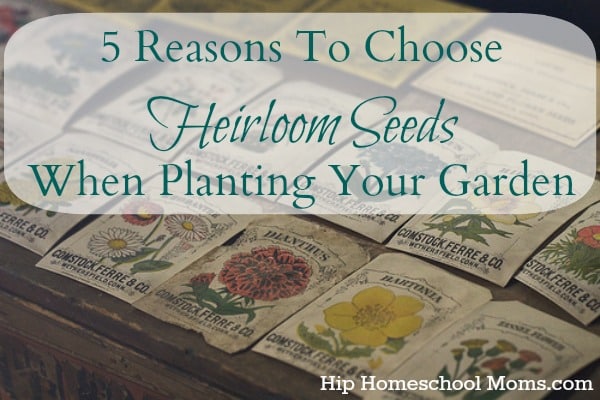When planting your garden this spring, one of the most important things to consider is the kind of seeds you choose to plant. Below you will find information about the 3 basic types of seeds and why heirloom seeds are a great choice.
Photo Credit: Chiot’s Run via Compfight cc
- First generation hybrid seeds {F1 hybrids} – These are the most common seeds sold by multinational seed companies. These seeds have been hand-pollinated and are almost always sterile. This means that you cannot save the seeds from the plants that are grown, but are dependent on the seed companies to supply seeds for your garden year after year.
- Genetically engineered – Some seeds sold at the stores are not only hybrid but are genetically engineered. The DNA of genetically engineered seeds have been altered for specific needs. For instance, fish genes have been spliced into strawberries and tomatoes to make them more tolerant to frost. These alterations result in species mutation, and create food that God never intended the human body to consume. Studies show that foods grown from genetically engineered seeds can create allergies and are harmful to the heart, spleen, adrenal system, and blood cells. {Source: Seeds of Deception}
- Heirloom seeds – Heirloom seeds are pure, open-pollinated, non GMO, and originate from hundreds of years ago.

This is great Jill! I do have a question for you about something you mentioned here, and I wanted to leave the comment on your blog.
Some friends and I were talking about different seeds we were planning on planting in our gardens the other day, and someone mentioned that GMO seeds are only sold to and grown by farmers who’ve signed contracts with Monsanto (since it’s such a money racket) and that hobby gardeners don’t have access to GMO seeds. I had always thought that certain seeds, like corn, were all GMO unless they were organic or heirloom.
You mentioned in your posts that you sourced Seeds of Deception for your info on seeds being genetically modified. Do you know whether it addresses that it’s all seeds of a certain variety or only seeds planted by commercial growers. I’ll still continue to buy organic or heirloom seeds anyway, but the conversation got me thinking. Thanks!
Great question! I’m under the impression that when purchasing hybrid seeds, we don’t know for sure if the source is GMO or not because that information is not required on the label. As you said, I’ve also heard that all varieties of corn are GMO unless organic or heirloom. If a person were buying hybrid seeds, I would make sure that I researched the company and asked questions about the source of the seeds. Thanks Meagan! 🙂